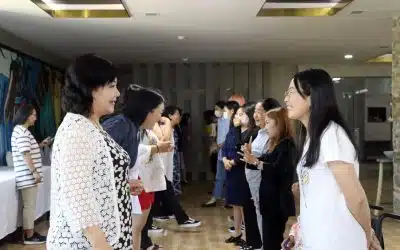InAsia
Insights and Analysis
Building Critical Thinking in ASEAN Classrooms
July 18, 2018
Traditional classrooms in ASEAN countries are exceptional for turning out high-performing students, well-skilled in memorization, recitation, and deference to seniority, an approach some say doesn’t equip students for a dynamic, entrepreneurial, and rapidly changing world. According to the World Economic Forum, young people will best succeed in the knowledge economy when equipped with problem-solving and critical-thinking skills.
In response, there is a new push to equip students with these highly coveted skills, to prepare them to compete for the best jobs, and to ensure that national workforces and economies can keep pace with global change. The Thammasat University School of Global Studies, the Thailand Development Research Institute, The Asia Foundation, and the U.S. Department of State recently conducted a workshop in Bangkok, called Critical Thinking in Classrooms, that brought together 60 exceptional young leaders from across ASEAN through the Young Southeast Asian Leaders Initiative (YSEALI).

YSEALI critical thinking participants
The U.S. ambassador to Thailand, Glyn T. Davies, opened the workshop by challenging participants to question their assumptions and to use their new-found training to turn their ideas into innovation and action. “The goal of the workshop is to inspire you so you can apply your newly acquired skills and undertake projects that lead to real-world impact.”
The growing need for critical thinking in the schools parallels the region’s changing dynamics and can best be understood within the social and political context of ASEAN. ASEAN countries are going through an intense socioeconomic transformation. Half are trapped in the “middle-income paradox,” where growth rates decline and economic development stalls. Many aspire to upgrade their industries to “catch up” with the rest of the world.
Critical thinking is the foundational skill for innovation—the secret recipe for economic progress. Wilson Yeo, a lecturer at Singapore Polytechnic and a YSEALI participant, encapsulated the complex relationship between a changing economy and the need for critical thinking. “In Singapore, the focus of education has always been to help students to find a place in the economic engine that powers Singapore’s economy. It’s a fair goal. But because Singapore has gone very quickly from a manufacturing hub to a knowledge economy, the education system has not kept pace in some ways with the change.”
In addition to economic change, current trends in governance and democracy underscore the need for critical thinking in ASEAN. The recent electoral victory of Malaysia’s opposition party is a case in point. After a decade of intractable corruption and increasingly partisan politics, the Malaysian electorate voted for change. Growing political awareness across Malaysian society—especially among the young, who accounted for 41 percent of all voters—played a crucial role in bringing about this change.
“Finally, for the first time in history, change can happen if we are critical with our voice,” said Suet Li Liew, a consultant to the Ministry of Education and a YSEALI participant from Malaysia. “Now there is investigation into corruption cases, cronyism, and misconduct, something we could not imagine before.”
Pii Arporniem, a YSEALI participant from Thailand, connected critical thinking to informed citizenship. As Thailand approaches elections in 2019, he argued, citizens must learn to distinguish fact from fiction and to weigh the merits of opposing opinions. ASEAN has been shaken by distorted news that feeds divisive politics. Critical thinking is the vital antidote to disinformation and “fake news” that, at the extremes, can breed ultranationalism.
Acknowledging its importance, where should we begin to instill critical thinking?
First, teaching critical thinking must start in preschool. It must be a part of the educational foundation of every classroom.
Second, pedagogical methods that promote critical thinking, such as debate and dialogue, must be integrated into all subjects. Teaching critical thinking as a separate discipline discourages a holistic approach to higher-order thinking.
Third, critical thinking must be taught together with creative thinking, communication, and collaboration skills. Students must learn to express their thoughts in a constructive and effective way.
While these young leaders embraced the importance of critical thinking, not all were optimistic. Critical thinking is best situated in an environment that accepts open-mindedness, equality, and freedom. Resistance to outspoken and open-minded people still exists throughout ASEAN, rooted in Asian traditions that prioritize seniority and authority, and ASEAN’s young people still struggle to think in new ways and to voice their thoughts effectively.
ASEAN’s youth are ready for the dawn of the new era. Will everyone else be ready?
Rattana Lao is a policy and research program officer for The Asia Foundation in Thailand. She can be reached at [email protected]. The views and opinions expressed here are those of the author and not those of The Asia Foundation.
About our blog, InAsia
InAsia is posted and distributed every other Wednesday evening, Pacific Time. If you have any questions, please send an email to [email protected].
Contact
For questions about InAsia, or for our cross-post and re-use policy, please send an email to [email protected].The Asia Foundation
465 California St., 9th Floor
San Francisco, CA 94104
The Latest Across Asia
Program Snapshot
April 18, 2024
News
April 17, 2024

2024 Lotus Leadership Awards
Thursday, April 25, 2024, New York City
The Lotus Leadership Awards recognize contributions towards gender equality in Asia and the Pacific







0 Comments